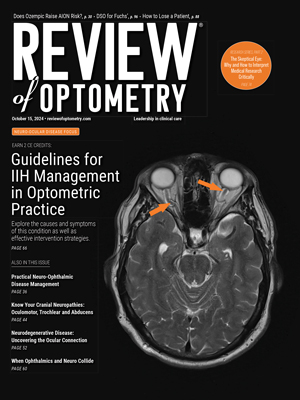Researchers recently completed a retrospective study on treatment-naïve patients with macular edema due to retinal vein occlusion (RVO) and found anti-VEGF therapy provided visual gains for the majority of patients. The study included 15,613 patient eyes (mean baseline age 72.4; 54% female) between 2013 and 2019.
The researchers observed that after six months and a mean of 4.5 anti-VEGF injections, 8,876 eyes with branch RVO had a mean visual acuity increase of 9.4 letters from a baseline of 55.1 letters. For 6,737 eyes with central RVO, visual acuity improved by 9.2 letters over six months from a baseline of 37.2 letters, with an average of 4.6 anti-VEGF injections.
Between the two groups, visual acuity gains at one year were similar, with those with branch RVO receiving an average of 7.4 injections and those with RVO receiving an average of 7.6. The study noted that at six months and one year, the mean letter gain increased with the number of anti-VEGF injections. Those with a baseline visual acuity of 20/40 or better tended to lose visual acuity in one year, however.
Researchers concluded that mean change in visual acuity is correlated with treatment intensity, but those with better visual acuity at baseline are susceptible to vision loss, indicating a ceiling effect. They noted that visual acuity gains compared favorably with one-year visual acuity gains in neovascular AMD and diabetic macular edema, but when compared with corresponding randomized trials, there was a larger gap.
Ciulla T, Pollack JS, Williams DF. Visual acuity outcomes and anti-VEGF therapy intensity in macular oedema due to retinal vein occlusion: A real-world analysis of 15,613 patient eyes. Br J Ophthalmol. October 14, 2020. [Epub ahead of print]. |

